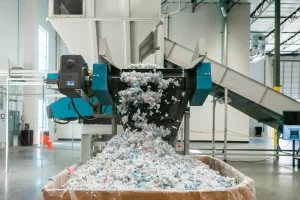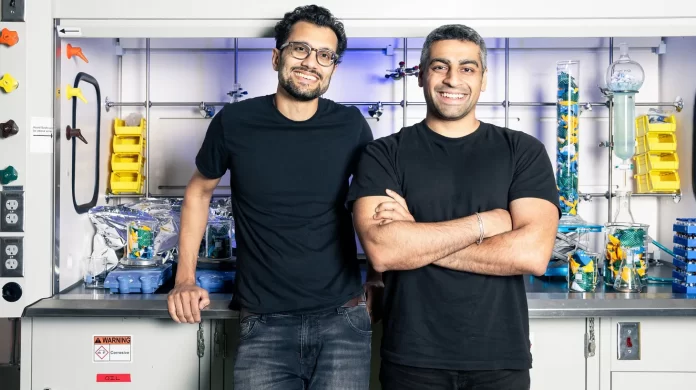“From Waste to Wardrobe: Ambercycle’s Breakthrough in Polyester Recycling and Circular Fashion”
Innovating LA’s Fashion Landscape: Ambercycle’s Polyester Revolution!
Hello, my fabulous fibers fanatics! It’s your favorite textile techie, Textile Topher, back again to dive into another inspiring story from the bleeding edge of textiles and sustainability. Today, we’re threading our way through the transformative tale of Ambercycle, a start-up that’s threading its innovative needle to stitch together a solution to LA’s fashion waste problem.

Polyester in the Hot Seat
First, let’s lay down the fabric of the matter: polyester. This pervasive synthetic fiber can be found in a slew of garments including your workout gear, stretchy jeans, and stylish pantsuits. Made from fossil fuels, polyester is notorious for its resilience and difficulty to reuse. Shockingly, about 65%** of our clothing ends up in landfills less than a year after we buy them.
But Ambercycle, a start-up rooted in the vibrant soil of Boyle Heights, LA, has a vision for change. You see, by leveraging cutting-edge chemistry and engineering, founders Shay Sethi and Moby Ahmed are reclaiming polyester from discarded clothes, turning trash into treasure.
The Genesis: UC Davis Days
Flashback to their days as college roommates at UC Davis, where Shay Sethi, a biochemist, and Moby Ahmed, a Genetics and Genomics graduate, were both engrossed in sustainability research. Realizing that current recycling approaches, akin to those used for plastic bottles, were unsustainable—they sought a better way. Extreme heat processes degrade plastic quality, and these can only be repeated a few times before the material becomes unusable.
Ambercycle’s Alchemy: Alchemical Adventures
Ambercycle champions a novel chemical process. Discarded garments are shredded into bite-sized pieces, then subjected to a chemical process that isolatively extracts polyester. The result? White polyester pellets ready to be converted back into brand-new clothes! These pellets are handed off to garment producers to be spun into yarn and eventually transformed into chic, sustainable fashion.
Imagine: a blend of high-tech chemistry and good old-fashioned elbow grease! Buttons, zippers, and other non-fabric elements are manually removed, ensuring the polyester can be seamlessly reintegrated into the fabric supply chain.
Recycled Polyester and Circular Fashion
Now, let’s talk about the impact and promise of recycled polyester. Using this material not only repurposes waste but also significantly reduces our dependency on oil. Traditional polyester manufacturing is an energy-intensive process, heavily reliant on petrochemicals. By recycling polyester, Ambercycle is minimizing that footprint. This transition is pivotal for the textile industry, which repeats the lifecycle of approximately
100 million tons** of garments annually, highlighting the need for scalable solutions.
A TEDIOUS TASK WITH A VISION
On a recent lively morning, Shay Sethi welcomed a group of students from Otis College, Cal Tech, and Pasadena’s ArtCenter College of Design to their innovative lab. This hands-on experience with the gritty reality of garment recycling emphasized the intricate challenge they are tackling. The students, armed with scissors, painstakingly removed buttons and zippers, gaining a first-hand understanding of fabric composition.
This meticulous undertaking has a profound educational value. Reaching into the multifaceted world of textile waste impresses every fiber of their learning. It highlights the importance of pushing against the fast fashion culture and critically assessing what we consume.
Fast Fashion: A Scourge Yet to Be Tamed
Ah, fast fashion – the tempter of wallets and the bane of sustainability! Recent Cal Tech graduate Jennah Coborn, a grant recipient for sustainable fashion studies, acknowledges the allure and pressure perpetuated by social media trends. Society’s insatiable appetite for new and ‘trendy’ items, often cheaper and of lower quality, exacerbates the waste problem.
Otis College student Alisa Bogaryan and her classmates are confronted with these challenges head-on in their projects. They are prompted to transform plastic waste into wearable art. Bogaryan’s journey with plastic necklaces demonstrates both the innovative spirit and the practical hurdles of working with such materials.
Educator’s Perspective: Untapped Potential
Kristine Upesleja, head honcho of these bright minds, expresses a shared frustration: the scarcity of recycled polyester for creative designs. Being at the intersection of education and industry, she wishes for more accessible recycled materials to proliferate sustainable designs. The promising news? With endeavors like Ambercycle’s getting traction, the landscape is bound to evolve.
The Road Ahead: Scaling Solutions
While Ambercycle has yet to turn a profit—growing any business takes time and patience—their focus on scalability is crystal clear. How do you transition from creating that first recycled T-shirt to a billion? This question underscores the monumental challenge ahead but also highlights the transformative potential of their technology. Converting the entire fashion industry’s oil-reliant practices to sustainable alternatives is ambitious, but it is precisely these big dreams that lead to revolutionary change.
The Broader Picture: Sustainable Innovations
What Ambercycle epitomizes is a broader trend in textiles and fashion technology: the quest for circularity. Circular fashion doesn’t just solve problems; it reimagines systems. By reclaiming and redefining materials, we minimize waste and foster an industry where sustainability and style go hand-in-hand.
Beyond the Fabric: A Call to Vote with Your Wallet
For the average consumer, this means being more mindful of clothing purchases and considering the end-life of our wardrobes. Supporting brands and start-ups committed to sustainability can create market-driven demand for recycled materials, paving the way for more innovations like Ambercycle’s.
Textile Topher’s Trivia Corner: Key Terms Explained
As we spin the final yarn of today’s entry, let’s unravel a few key terms that popped up:
1. Recycled Polyester**: Also known as rPET, this is polyester that’s been processed from existing polyester materials. It’s crucial for reducing waste and minimizing our reliance on new petrochemicals.
2. Circular Fashion**: An economic model that is restorative and regenerative by design. It replaces the end-of-life concept with restoration, shifts towards the use of renewable energy, eliminates the use of toxic chemicals, and aims for the elimination of waste through the superior design of materials, products, systems, and business models.
3. Fast Fashion**: A contemporary term used to describe the highly profitable business model based on replicating catwalk trends and high-fashion designs, and mass-producing them at low cost. Its expedited production processes allow retailers to bring their customers the latest styles quickly, leading to increased consumption and waste.
4. Chemical Recycling**: This advanced method uses chemical processes to break down materials back into their basic components. Unlike mechanical recycling, which can degrade the quality of materials, chemical recycling retains the integrity of base materials for high-quality reuse.
A Woven Future
Ambercycle’s approach is not just a smart business; it’s a vision of a sustainable future where fashion and fragility of our environment can co-exist. As we close this chapter, remember that each thread matters. Every decision—from the brands we support to the clothes we discard—has the power to rewrite the narrative of waste and weave a tapestry of sustainability.
Keep it sustainable and stylish, my fabulous fabric aficionados, and I’ll see you in our next exploration of the wonderful world where textiles meet technology!
Until next time, stitch sustainably!
– Textile Topher
Keywords: Ambercycle, Polyester, Recycling, (Post number: 27), Sustainability, Circular Fashion





